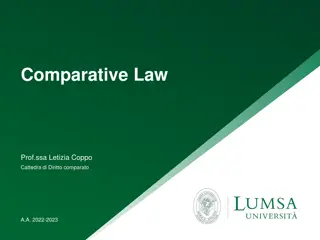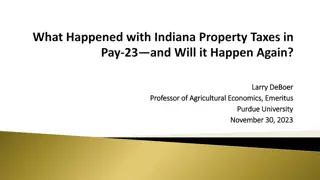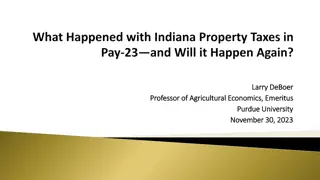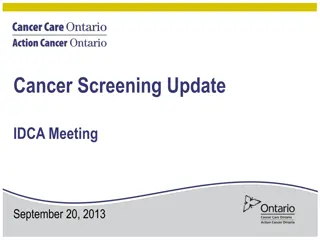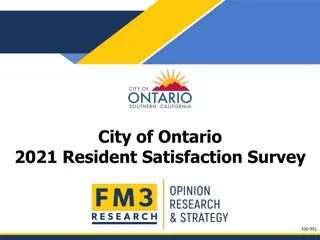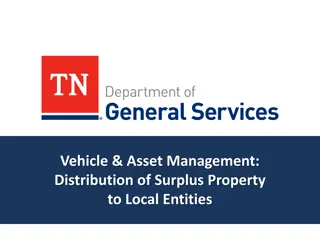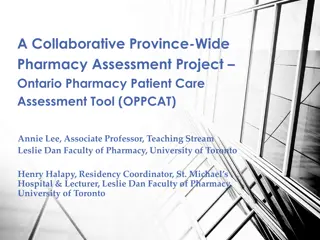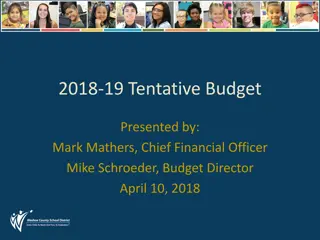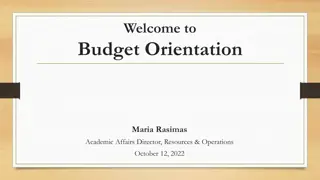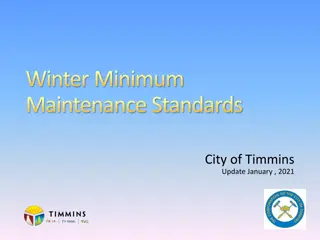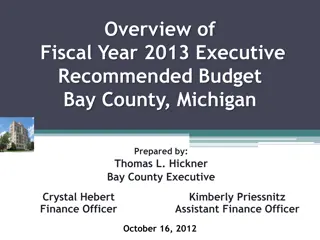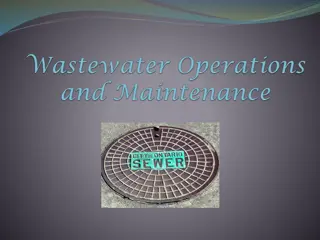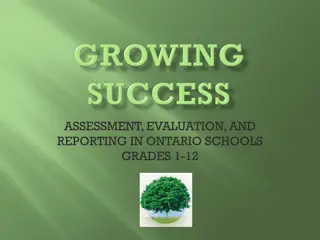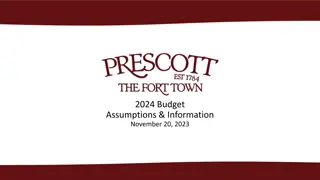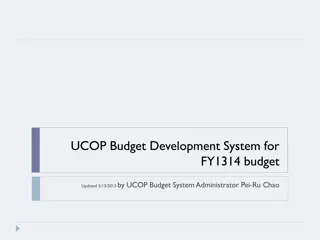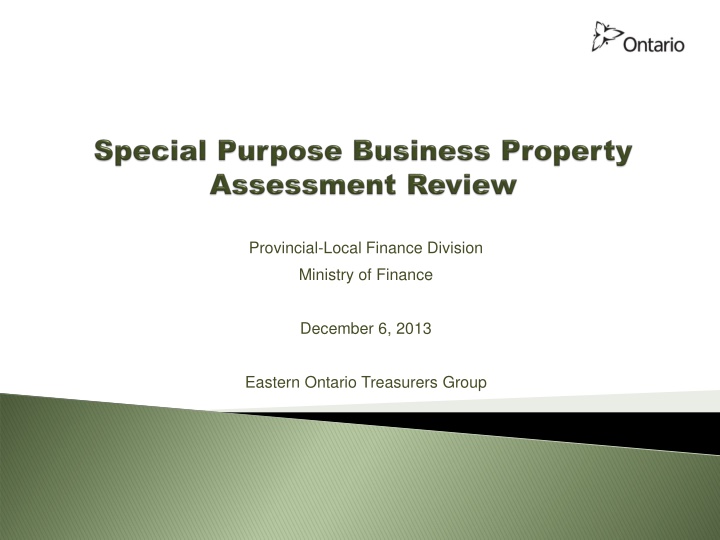
Ontario Property Assessment Review - 2013 Budget Overview
The 2013 Ontario Budget initiated a review of property assessment processes and the property tax system in Ontario. Led by the Ministry of Finance, the review focuses on specialized business properties like mills, landfills, and billboards, aiming to enhance assessment methodologies. Consultations with stakeholders and working groups are ongoing to ensure fair and accurate property valuations.
Download Presentation

Please find below an Image/Link to download the presentation.
The content on the website is provided AS IS for your information and personal use only. It may not be sold, licensed, or shared on other websites without obtaining consent from the author. If you encounter any issues during the download, it is possible that the publisher has removed the file from their server.
You are allowed to download the files provided on this website for personal or commercial use, subject to the condition that they are used lawfully. All files are the property of their respective owners.
The content on the website is provided AS IS for your information and personal use only. It may not be sold, licensed, or shared on other websites without obtaining consent from the author.
E N D
Presentation Transcript
Provincial-Local Finance Division Ministry of Finance December 6, 2013 Eastern Ontario Treasurers Group
The 2013 Ontario Budget announced a review of property assessment processes and the property tax system in Ontario Led by Steven Del Duca, Parliamentary Assistant Secretariat within Ministry of Finance has been established to support the Review The review focuses on areas where municipalities and taxpayer representatives have expressed an interest in working with the Province including: clarifying and refining the assessment methodologies applied to special- purpose business properties, such as mills, landfills, and billboards; looking at the assessment of farm properties; reviewing the timelines for the assessment appeal process; and considering other opportunities to strengthen MPAC. With respect to the assessment methodology issues, the review is dealing with specialized and unique types of business properties that often involve complex assessment methodologies. Residential property assessments are not within the scope of this review. Ministry of Finance 2
Consultations Issue specific Working Groups have been constituted in a targeted fashion to include interest groups and municipalities that have been impacted by particular assessment issues. Objective: discuss valuation methodologies and suggest an approach that results in fair, accurate, and predictable treatment of properties. Consultations on the broader issues of the review governance, business operations, and appeals are underway. Key previous and future events include: AMO MOU and TOCCA MFOA webinar Municipal Focus Groups Private Sector Focus Group A Property Assessment System Symposium with representatives from specific issue working groups and other stakeholders was recently held, focusing on: Feedback on description of future state and current challenges Validation of proposed solutions Identification of implementation risks and challenges Ministry of Finance 3
Summary of Specific Assessment Issues Issue Current Status Mills Recent ARB decisions have significantly reduced the assessment of large industrial mill properties in municipalities. As a result of the retroactive nature of the decisions, a one-time tax refund is owed to mill property owners. The Working Group has met several times, and has been deliberating on short-term options to address the tax refund and longer-term options including reviewing assessment methodologies. Landfills MPAC proposed changes to the valuation methodology of landfills for the 2013 tax year. Stakeholders expressed concern about the potential impact of the change in assessment methodology. Various assessment methodology options have been developed for discussion with the Working Group. Billboards Historically, the Municipal Property Assessment Corporation (MPAC) did not assess most billboards. MPAC was planning to update the values and assess all billboards province-wide for the 2013 tax year. Stakeholders expressed concerns about the new approach proposed by MPAC. Various assessment methodology options for the billboards structure and the land have been developed and considered by the Working Group. Industrial Lands Concern has been expressed about the potential impact of assessment increases on the viability of ongoing business operations, particularly industrial operations, in areas where redevelopment pressures are causing increases in property values. Options development is underway with the Working Group to seek a solution that conforms to existing assessment and planning principles. Farms Valuation of farmland: The Working Groups is considering methods to ensure sale prices used for assessment purposes reflect only farmer-to-farmer sales, especially in urban fringe areas. Tax classification of grain elevators: The Working Groups is considering changing from the industrial tax rate to commercial for licenced operations, and to farm for grain elevators operated by and for a farmer. 4 Ministry of Finance
Previous Initiatives & Existing Efforts The 2006 Ombudsmen s Report attempted to address particular concerns raised, generally pertaining to the assessment of residential properties. The 2010 Auditor General s report assessed whether MPAC had adequate systems and procedures in place to ensure the accuracy and cost efficiency of its operations, primarily related to residential properties. MPAC s 2013-2016 Strategic Plan suggests a number of reforms to corporate image, business operations, and functions. In April 2013, the ARB introduced a new Streaming Strategy to resolve the majority of its current and new caseload within the next four-year assessment cycle. These prior and existing efforts focussed on improvements to the assessment of residential properties and have increased efficiencies in the system. Some operational issues were addressed, but issues associated with special purpose business properties and the broader assessment system were not specifically identified or addressed 5 Ministry of Finance
What we have heard: Overall Governance Tensions arise out of MPAC s mandate to represent the interests of multiple parties (i.e. municipalities, Province, MPAC Board of Directors, taxpayers). There is lack of clarity and agreement about MPAC s accountability in establishing and defending assessment values. There is room for improvement in terms of communication between the various parties involved in the property assessment and tax system. Development and implementation of assessment methodology does not always consider the assessment policy objectives or implementation realities. Opportunity to review the roles and responsibilities of all parties to ensure efficient and effective operation of the property assessment system. 6 Ministry of Finance
What we have heard: Business Operations Lack of communication and service between municipalities and MPAC regarding the process for establishing values and risk involved (particularly through the appeal process). Concerns have been raised about lack of documented and transparent assessment methodologies and processes and application of global/macro approach to specific sites. Questions about assessment expertise and capacity at MPAC and the need for other parties to hire experts. Need for accurate values and data that can be relied on (predictable for both taxpayer and municipality). 7 Ministry of Finance
What we have heard: Assessment Appeals Concerns have been expressed about appeal timelines and process E.g. delays in appeals process create retroactive pressures for municipalities. The appeal process appears to have become an unavoidable element of the assessment valuation process for special purpose properties. This appears to be unlike other jurisdictions such as B.C. and Quebec. Consider mechanisms that would help to decrease number of appeals. Municipalities need to consider adopting financial risk management strategies to mitigate against potential assessment/appeal losses. The ARB has implemented policy directives in an effort to address the appeals backlog and concerns regarding timelines, e.g. through its 2013 Streaming Strategy. 8 Ministry of Finance
Desired Future Mode of Operation (FMO) of Assessment System and Process Assessment methodologies are reflective of best practices or industry standard. Roles, expectations and accountabilities of all parties within the property assessment system are clear, confirmed and agreed upon Assessment methodologies are based on sound reasoning and can be justified in an objective manner. Parties communicate regularly and share information in a respectful and timely fashion Assessment methodologies are applied to specific types of properties in a defensible, transparent and predictable manner. Acknowledgment of and mitigation strategies for conflicts of interests which may arise out of the assessment authority s perceived need to protect the interests of multiple parties. Sensitivity to sudden or unexpected shifts in property values of special purpose business properties, which cannot be substantiated by market variance. Cohesive interaction between all arms and entities within the property tax and assessment system, with the ultimate goal of ensuring a fair, predictable, and accurate process and system. Assessment valuation that results in accurate and fair values, and respects assessment and tax policy intent as legislated. Assessment policy and law clearly articulates intent Communication of future assessment methodology changes, value changes, and other related changes to affected parties with sufficient advance notice. Assessment process, including appeals, occurs in a timely fashion. Recognition that the goal of the appeals process is to ensure fairness in assessment, as opposed to winning every appeal. Sufficient capacity and competency exists to handle the assessment of special purpose business properties. 9 Ministry of Finance
Identifying Solutions Efforts have been made to identify potential solutions based on research to date, and feedback heard through the extensive review consultations process. The proposed solutions have been categorized into three main categories as per what has been heard. Governance; Business Operations; and Appeals System. While there are three main categories, there are some solutions which address multiple concerns. Focussing the discussion: Solutions need to address root causes as opposed to just symptoms. The solutions included are entirely based on consultations and research to-date. - Looking for validation of what we have heard, and to have a conversation about implementation challenges. 10 Ministry of Finance
Solutions to Explore: Governance Modernize and ensure accountability in the relationships within the property tax and assessment system. Consider issues related to MPAC s board structure. - E.g., board role and responsibilities, composition (representative vs. expert), member profiles, and independent advisory support. Update and make public existing documentation between MPAC and MOF to clarify roles, responsibilities, and accountability frameworks, and ensure assessment methodology implementation is consistent with policy goals of market value assessment. Work with stakeholders (e.g. municipalities, taxpayers, ARB) to develop and refine performance measures and standards, including customer service and operations-focused key performance indicators to ensure they reflect the needs of other parties within the assessment system. Develop a new arrangement between MPAC, MOF, and municipalities to establish service level agreements which make transparent and accessible the parameters of services, accountability frameworks, performance measures, enforcement mechanisms, and support needs. Review practice/approach related to municipal financing (e.g. reserves) Consider implementation of regular, arms-length performance review function. Review MPAC s leadership structures and corporate culture. 11 Ministry of Finance
Solutions to Explore: Business Operations Increased communication and consultation with stakeholders. Mandated recurring stakeholder discussions and consultations to develop the parameters and guidelines for assessment methodology. Improve, enforce, and measure customer service protocols (e.g. service satisfaction surveys) at MPAC for all customers including taxpayers and municipalities. Mandate that MPAC makes their stakeholder approved KPIs and annual performance reports public. Improved information disclosure mechanisms and transparency. Develop advance disclosure requirements for MPAC to share data parameters and calculations used to determine assessed values to ensure predictable application of consensus assessment methodologies. Develop assessment methodology change disclosure protocol to improve transparency and to document and communicate in advance the rationale for any intended or anticipated significant change or anomaly (e.g., value, classification or methodology). Require reciprocal information sharing to facilitate accurate property valuation. Require MPAC to seek-out and consider information shared by taxpayers, municipalities and the Province in the valuation process. Assess competency and capacity of assessment authority. Review MPAC succession planning and hiring practices. Review assessment valuation approvals processes. Ensure assessor accreditation is consistent with international standards and is implemented to match the type of work needed. Improve data quality assurance. Improve data integrity, track in-year changes of assessed values, and report such changes to stakeholders in a timely manner. Assess data checking and data input approval mechanisms. Ensure MPAC s data and information technology systems can interact with municipal and provincial data systems. 12 Ministry of Finance
Solutions to Explore: Appeals System Increased awareness and education of parties. Educate all parties about roles and responsibilities in the valuation and appeal processes. Encourage greater engagement, consultation and communication in appeals process. Establish consistent protocols for MPAC to engage municipalities prior to ARB processes and support any settlement processes. Improve MPAC s reporting and tracking of pending appeals to municipalities. Create protocol for MPAC assessors and legal counsel to adequately prepare for and consult with parties prior to and as part of ARB hearings, in a timely fashion. Alter existing legal authorities and policy directives. Consider expanding the use of the Request for Reconsideration (RfR) process to special purpose properties. Consider greater use of the alternate dispute resolution (ADR) process. Consider legislative amendments or regulations to strengthen assessment methodology and process (e.g. advance disclosure requirements that may reduce the number of appeals). Modify ARB streaming process to prioritize appeals with greatest impact on municipal assessment base. Consider implementing mitigation strategies and providing support to municipalities in the appeals process. Develop tools to support municipalities through the appeals process. 13 Ministry of Finance
We want to hear from you Questions for discussion: Do you have any observations that have not yet been captured by the review? Do you agree with the description of the future mode of operation? Do you feel that the proposed solutions will help us achieve the proposed future mode of operation? How do you think the proposed solutions will impact your work and your municipality s? What concrete actions or processes could be put into place to operationalize the solutions? What risks can you identify to the successful implementation of the solutions? How would you mitigate these risks What role should each of the parties (MPAC, ARB, Ministry of Finance, municipalities, and taxpayers) play in the system, and how should each of the parties be made accountable for performing their roles effectively and efficiently? 14 Ministry of Finance

